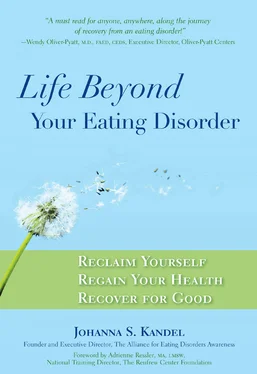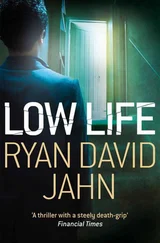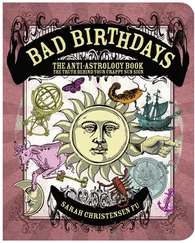They hoped that we’d work on our technique and also lose a bit of weight before the auditions took place.
I don’t actually know if I lost any weight on my “healthy” diet, but I auditioned, and out of the fifteen girls in my class I was the only one not chosen for a part. The people from the ballet company took me aside and told me that the reason I hadn’t been cast was not that I wasn’t good enough, but rather that I looked so young. I was, in fact, one of the smallest and youngest in my class, but despite what they said, I believed they really meant that I was too fat and they were just trying to be kind. At that point I made a pact with myself: no matter what it took, I was going to get a part the following year.
I became very strict and rigid with my diet. I started to exercise even more, and I did lose some weight. People noticed very quickly, and they were telling me how good I looked, which made me feel great. But it also convinced me that I must have been really big. If not, after all, why would they be making such a big deal over the weight I’d lost?
Despite what they said, I believed they really meant that I was too fat.
Some time near the end of my seventh-grade year, our health teacher showed a made-for-television movie about a young gymnast who was battling an eating disorder. I think that most of my classmates watched the girl in that movie and thought, What is she doing? That’s terrible! But I looked at it and thought, Hey, I can do that for a while. I’ll just get down to my goal weight and then I’ll stop. I still thought losing weight was all about control, and since I was losing weight, I felt as if I were in control. Once I’d started, I just couldn’t stop. My eating disorder took control of me. In retrospect, the danger of those movies (and we’ve all seen them) is that they provide anyone who’s predisposed to developing an eating disorder with step-by-step instructions for how to do it really well.
Have you ever had a really bad stomach flu and had people tell you afterward how great you look because you’ve lost a few pounds? You might want to say, “Are you nuts? I was sick as a dog.” But you might also get the idea that if you stuck with a restrictive diet awhile longer, you’d look even better. That was more or less how it went for me. I cut back more and more on my food intake, and the response I got from other people was, “Wow, Johanna, I wish I had your willpower. You can just sit there with a piece of cake in front of you and not eat it.” Meanwhile, I was dying on the inside. People seem to think that anyone with an eating disorder simply isn’t hungry or is indifferent to food, but that’s the furthest thing from the truth. I thought about food all the time. My life revolved around what I was or wasn’t eating, how much I was exercising and all the negative thoughts that constantly played like an endless tape loop in my head: I’m not good enough. I’m not smart enough. I’m not thin enough. Nobody’s going to like me. Every day I was able to fight off the hunger, I felt I’d won—even though the only person I was at war with was myself.
I was dying on the inside. My life revolved around what I was or wasn’t eating, how much I was exercising and all the negative thoughts that played like an endless tape loop in my head.
By the time I entered ninth grade, however, I stopped getting positive feedback for losing weight. The remarks of my teachers and classmates began to change. People started to ask me if I was all right. And to tell me that I looked really tired. I was already exhibiting various symptoms of anorexia—the paleness, the circles under my eyes, the sunken cheeks, the tiredness. I was tired all the time, but I still had the mental strength to get up, go to school, dance eight hours every day and maintain straight As. I was truly running on empty, but for the first time in my life I felt that I was really good at something; my eating disorder was rewarding my perfectionism. Even though it was the furthest thing from the truth, I believed that I was in complete control. In addition, because so much of my limited energy was focused on my eating disorder, I didn’t have any energy left to think about anything else. I was emotionally numb, and I liked that because I no longer had to worry about whether or not I was good enough for my parents, for the world or for me.
Every day I was able to fight off the hunger, I felt I’d won—even though the only person I was at war with was myself.
Tenth grade was probably the height of my anorexia. I’d re-auditioned for several parts in The Nutcracker and gotten every role I tried out for, but now even my ballet instructor was very worried and started to express her concern about my weight. I still remember the day she took me aside and told me I’d lost too much weight. I felt so anxious and so guilty that I went home and had my first binge episode. I just wanted that feeling of anxiety to go away, and bingeing allowed me to stuff down the uncertainty and apprehension, at least for the moment. But almost immediately after, I would again be overwhelmed with guilt. Still, the anorexia continued throughout my junior and senior years of high school. I even passed out a few times—luckily never while I was driving.
I believed that I was in complete control.
Everything came to a head one evening in my senior year, when I had flown to New York to audition for a ballet company. When I got back home, still wearing my ballet tights under my jeans, I went into the bathroom to change. I’d always been very careful not to let people see my body, because I was so ashamed and uncomfortable in my own skin. When I looked in the mirror what I saw, although I didn’t realize it at the time, was a distorted image of myself. If you’ve ever looked in one of those fun-house mirrors that makes you look extremely distorted, you’ll know what I saw when I looked at my reflection. The only difference is that when you’re in the fun house, it’s the mirror that’s doing the distorting, but for me it was what my brain thought it saw. I wore layers of baggy clothes and always made sure to change in the bathroom with the door closed. On this particular evening, however, the door was apparently not completely shut, and just as I was taking off my dance clothes with my back to the door my mother happened to walk around the corner and glimpse for the first time in almost six years what I had been so careful to hide. When she saw me, she started to cry. She began shaking me and screaming, “What are you doing? You’re killing yourself!”
I no longer had to worry about whether or not I was good enough for my parents, for the world or for me.
Whenever I tell my story, people want to know, “What about your parents? Didn’t they notice anything?” I admit that I sometimes wondered that myself; however, by that time I was driving myself to ballet class, and if my mother ever did see me in performance, I was on a stage, wearing a tutu and tights, with makeup on and my hair in a ballet bun. In other words, I was no longer Johanna. And the truth is that many people did know what was going on. I know now that several of my teachers had noticed my weight loss and expressed their concern to one another. And my best friends admitted later that they had been very worried but had been afraid to confront me because they thought I’d be angry and that would be the end of our friendship. In fact, while everyone knew I had a problem, no one quite knew what to do about it.
I’d always been very careful not to let people see my body, because I was so ashamed and uncomfortable in my own skin.
In addition, I’d become extremely manipulative and careful about keeping my secret from my parents, because I knew they were the only ones who could force me into treatment—and the last thing I wanted to do was let go of the eating disorder. It was my best friend and yet my worst enemy; it was what I knew and what I could count on. It was safe and, although very dangerous, very comfortable. I knew what it was like to have an eating disorder; I didn’t know what it was like to recover—and what is known always feels safer than what is unknown. If there was a message on our answering machine from a friend’s parent, I erased it before they got home. If my guidance counselor asked what I’d eaten that day, I’d come up with a whole list I could rattle off so convincingly that I sometimes got angry with myself for eating things I actually hadn’t eaten. The truth was that my parents didn’t really have any reason to think there was anything wrong. My mother had come from a family where every bite of food was cherished, and she’d been very thin as a young woman, so the idea that I would purposely starve myself was a completely foreign notion to her. In addition, I was dancing six to eight hours a day, so it would stand to reason that I was thin, and whenever I ate with my parents I managed to manipulate my food and make it appear as if I were eating. For people who don’t have an eating disorder, all this may be hard to imagine, but if you have or have had an eating disorder, I’m sure you know exactly what I’m talking about. Those of us with eating disorders become experts at keeping our secrets.
Читать дальше












